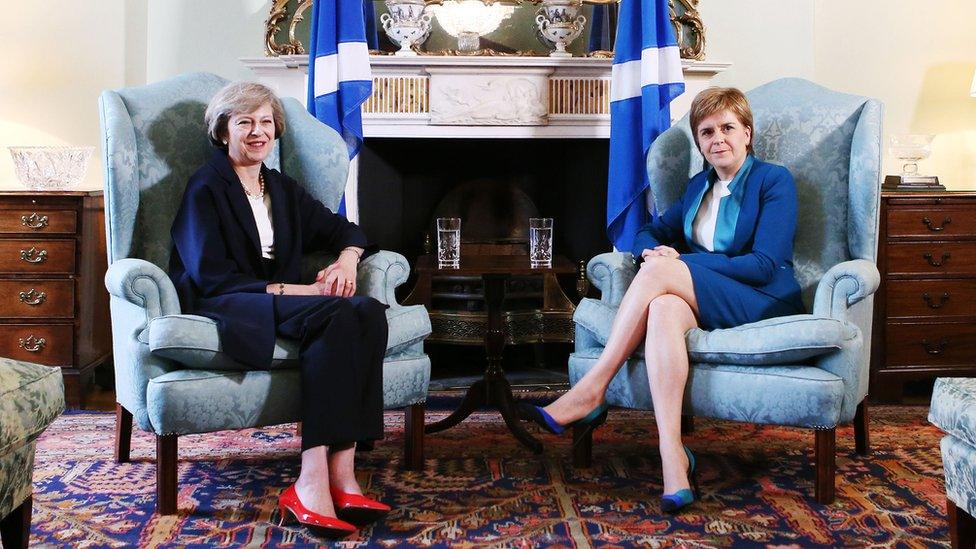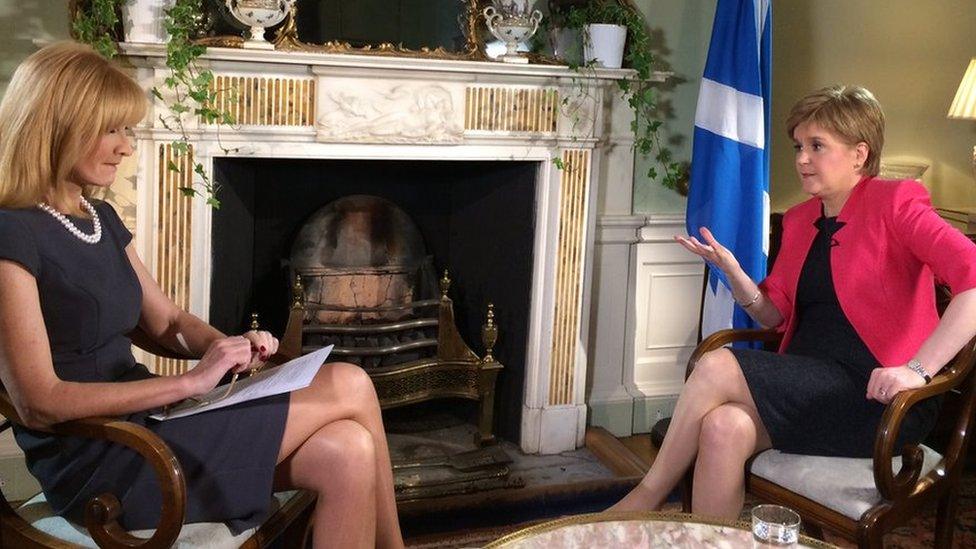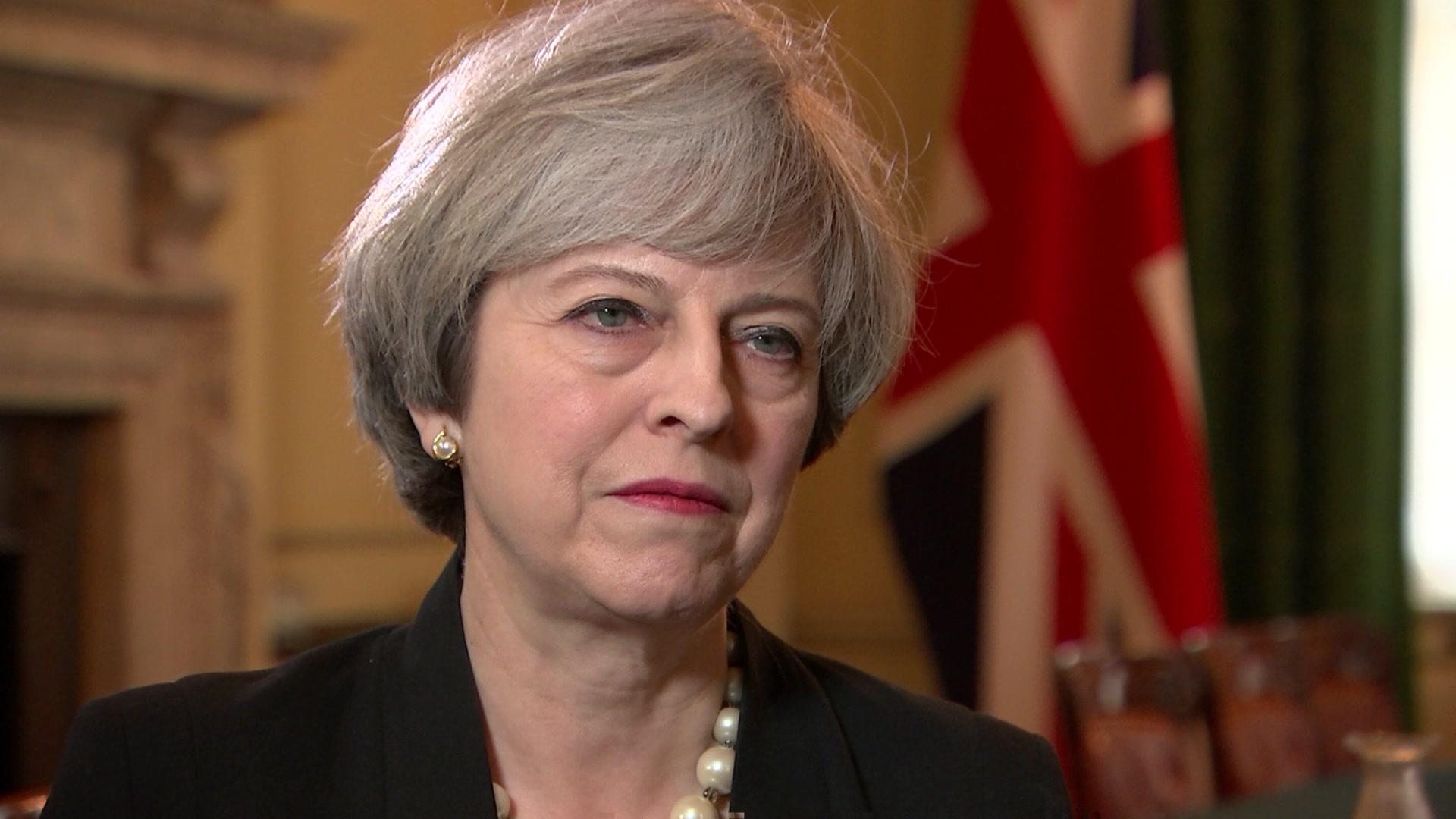Nicola Sturgeon 'up for discussion' on referendum date
- Published
- comments
Nicola Sturgeon: "I am up for continued discussion."
Scotland's first minister has told the BBC she wants to find a referendum date that both sides can agree on.
Nicola Sturgeon said she was "up for continued discussion" with Theresa May on the matter.
The prime minister insisted this week that "now was not the time" to hold a second independence referendum.
And she indicated that the UK government would not give approval to the SNP's preferred timetable of between autumn 2018 and spring 2019.
Ms Sturgeon believed it was imperative for a vote on Scotland's constitutional future to take place once a deal had been agreed on the UK exiting the European Union.
The focus on a Scottish independence referendum comes as the SNP meet for its spring conference in Aberdeen.
On the first day of the gathering, the party's deputy leader Angus Robertson said it would be "totally unacceptable" for Westminster to deny a referendum before Brexit was finalised.
In his speech, the SNP MP said: "Let there be no doubt - Scotland will have its referendum and the people of this country will have their choice. They will not be denied their say."
'Let her set out what she thinks'
Ahead of her keynote speech on Saturday, Ms Sturgeon spoke to the BBC's Sarah Smith.
She said: "We [Ms Sturgeon and Mrs May] have got a disagreement. What I am saying today is let us try and work our way through that disagreement.
"Now, I am no paragon of virtue about these things - it takes two to have a relationship, I absolutely accept that. But I have tried really really hard to find compromise with the PM over the last few months."
Ms Sturgeon added: "So let her [Mrs May] set out when she thinks it would be right and then let's have a discussion about it - who knows we might be a matter of weeks or months apart.
"I am up for continued discussion, but people will recognise in any walk of life - not just in politics - you can't have discussion and reach compromise with people who are not prepared to enter into discussion and are not prepared to countenance compromise and that so far has been my experience of the PM."

Analysis
By BBC Scotland's political editor Brian Taylor
I do not believe that the first minister is attracted to the idea of a non-consensual referendum. I believe she would see it as gesture politics, not the actions of a long-standing elected government. I believe further she would question what it would achieve, given that it might face a boycott from supporters of the Union.
So might she engineer an early Holyrood election? Might she seek an overall majority in the Scottish Parliament in order, presumably, to bring the Prime Minister to the negotiating table?
She might. It is feasible. But, again, I think it is highly unlikely.
Broadly, there are three objections:
One, folk tend to hate unnecessary elections.
Two, it might go wrong for the SNP. One can never be sure with polling in unusual circumstances - and a proportional electoral system.
Three - and this is the main one. The SNP's demand for a referendum is predicated upon a line in their manifesto to the effect that they reserved the right to hold a further plebiscite in the event that the people of Scotland were taken out of the EU against their declared will.
Analysis
By the BBC's Scotland editor Sarah Smith
Speaking to me today, Ms Sturgeon indicated she might be prepared to discuss the timing of another vote with Mrs May.
The Scottish government want a referendum between Autumn 2018 and Spring 2019.
It looks like they would be prepared to negotiate a different, later, date.
However, it is not yet clear that the UK government are prepared to talk about a date.
The PM did say "now is not the time" for another referendum. She didn't say never. So, will she talk about holding a vote in the future?
That seems to be the question today.

The SNP conference got under way just 24 hours after the Scottish and UK governments clashed over a second referendum.
Ms Sturgeon insisted that a referendum should go ahead on her timescale.
It followed Mrs May rejecting calls for a second independence vote before Brexit.
'Bad for us all'
Meanwhile, Mrs May used a speech in Wales to defend the UK.
She said the "precious bond" between England, Scotland, Wales and Northern Ireland was much more that just "constitutional artefact".
Mrs May went on to tell a gathering of Conservatives in Cardiff that a second Scottish independence referendum would be "bad for Scotland, bad for the United Kingdom, and bad for us all".
The prime minister added: "The coming negotiations with the EU will be vital for everyone in the United Kingdom.
"Every person, every family, every business, every community the length and breadth of the United Kingdom - England, Scotland, Wales and Northern Ireland.
"As the prime minister of this United Kingdom, I will always ensure the voices and interests of England, Scotland, Wales and Northern Ireland are represented as we negotiate to leave the EU."
Mrs May had already accused the SNP of forcing a "fundamentally unfair" independence referendum that would damage Brexit negotiations.
Writing in the Times, external, she said: "The SNP is trying to force the UK government to agree to something that is fundamentally unfair to the Scottish people.
"It wants to ask them to make a crucial decision without the necessary information.
"They would not know what the new partnership with the EU would look like, or what the alternative of an independent Scotland would be. It would simply not be fair."
The article follows a television interview on Thursday, in which she said "all our energies" should be focused on negotiations with the European Union.

Theresa May has said "now is not the time" for Nicola Sturgeon to call for an independence referendum
At the SNP conference later, Deputy First Minister John Swinney will address domestic Scottish matters as the parties in Scotland prepare for May's local government elections.
Mr Swinney said the spring conference, which will be attended by 2,500 delegates, would "underline our party's top priorities of education, the economy and our public services".
- Published17 March 2017
- Published16 March 2017

- Published16 March 2017
